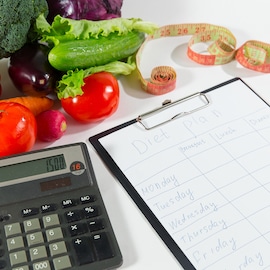Creating a Diet Diary for Weight Loss
Not everything to do with losing weight needs to be hard. There is one thing that you can do that takes practically no time, but that offers a great return on your investment: You can maintain a food journal.

Not everything to do with losing weight needs to be hard. There is one thing that you can do that takes practically no time, but that offers a great return on your investment: You can maintain a food journal.
According to recent research done at the University of Vermont, spending no more than 15 minutes a day making a note of everything that you eat; calories, grams of fat and so on, correlates with greater success in achieving weight loss goals.
Why should maintaining a food log be so effective?
It’s easy to eat and drink without thinking about what you’re doing. When you write in a diet diary, however, you force yourself to think about your food choices. Even if you do cheat on your diet and eat a couple of sugar doughnuts, you are likely to truly understand what you’ve done when you write it down. You may find yourself determining to cut down on your calories at another meal to cancel out the effect of the doughnuts. As you become used to logging your food, your mind will learn to make healthier choices.
What follows are tips that can help you get the most out of your diet diary.
Choose a journal that you like
You don’t have to write your diet down with pen and paper if you’d rather do it on your phone. Whatever method you can stick with is the best one for you.
Don’t put off recording what you eat
The best way to make sure that you don’t forget to record what you eat is to record it before you eat it. It can also be a good way to stick to a system, to write down everything that you plan to have over the day, the first thing each morning. Then, when you’re tempted to sneak a little something extra in, you’ll have the incentive to resist; you will not want to eat anything that’s not already recorded in your journal.
Anytime that you feel like snacking on something unhealthy to help deal with stress, the knowledge that you need to write it down first can give you pause.
Resolve to be honest
The aim of a diet diary is to help yourself truly understand how much you eat. It isn’t a way to pretend that you have perfect dietary instincts. When you write down what you eat, you come face-to-face with your relationship with food. You should make sure that you’re honest recording every single food item that you put in your mouth.
Measure the add-ons
If you put cream in your coffee, you need to write it down. If you put dressing on your salad, that needs to go into your diary, as well. From sugar to mayonnaise and dressing, it’s important to record everything. In the beginning, it can help to measure everything out with a measuring spoon or cup, at least until you learn how to eyeball your portion sizes correctly.
Record a few extra pieces of information
Since what you eat is often closely connected to how you feel, it can make sense to record in your journal what kind of state of mind you are in when you eat what you eat. It can also help to write down where you are, what you are doing and whom you’re with. You may notice correlations between your diet and some of these factors. These connections may help you realize that you tend to snack a lot with certain friends, or when there is a big meeting at the office. It can help you mentally prepare yourself to exercise restraint in these situations.
Creating a food journal is one of the best investments of time that you can make. You do need to take your journal seriously, and do whatever it takes to record every single thing that you eat, however. When you study your journal at the end of each week, you’ll likely be surprised at the patterns that you see, and how much more you’re eating than you thought you were. A food journal can strengthen your resolve to eat responsibly, and stay away from emotional eating or eating as part of another activity, like movie watching.




